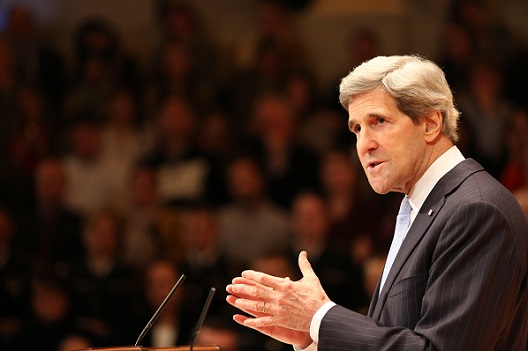![U.S. Secretary of State John Kerry delivers remarks at the University of Virginia in Charlottesville, Virginia, February 20, 2013. [State Department photo/ Public Domain]](http://www.atlanticcouncil.org/wp-content/uploads/2016/03/20160318_ISISgenocide.jpg) It is right and proper that the US House of Representatives (by a vote of 393 to zero) and the Obama administration have declared that the Islamic State (ISIL, ISIS, Daesh) is employing genocide in its effort to fill vacuums of political legitimacy in Syria and Iraq. As Secretary of State John Kerry accurately noted in his statement of March 17, “The fact is that Daesh kills Christians because they are Christians; Yezidis because they are Yezidis; Shia because they are Shia.” A parallel fact of greater weight and significance merited neither a mention nor a footnote in Kerry’s statement: that Syria’s Assad regime has killed some 200,000 civilians–multiples of the body count exacted by ISIS–in a deliberate campaign of mass homicide, the category of crime of which genocide is a subset.
It is right and proper that the US House of Representatives (by a vote of 393 to zero) and the Obama administration have declared that the Islamic State (ISIL, ISIS, Daesh) is employing genocide in its effort to fill vacuums of political legitimacy in Syria and Iraq. As Secretary of State John Kerry accurately noted in his statement of March 17, “The fact is that Daesh kills Christians because they are Christians; Yezidis because they are Yezidis; Shia because they are Shia.” A parallel fact of greater weight and significance merited neither a mention nor a footnote in Kerry’s statement: that Syria’s Assad regime has killed some 200,000 civilians–multiples of the body count exacted by ISIS–in a deliberate campaign of mass homicide, the category of crime of which genocide is a subset.
In the case of ISIS Kerry, quite justifiably, even went beyond the genocidal subset, saying “Daesh is also responsible for crimes against humanity and ethnic cleansing.” But he was silent with respect to the maestro of mass murder in Syria: Bashar al-Assad. That the Obama administration, having defended not one Syrian inside Syria from Assad’s five year campaign of mass homicide, wishes to avoid the subject may be understandable. It is nevertheless a mistake.
Perhaps the administration feared that mentioning Assad regime mass murder might stimulate calls to do something about it. And yet, it ought to matter to the administration how Syrians who have been on the receiving end of regime terror for five years would process the bye granted to Assad.
How perilous, after all, would it have been for Mr. Kerry to have said something like the following: ‘No less despicable than the genocidal practices of Daesh are the war crimes and crimes against humanity that have been inflicted on the people of Syria by the Assad regime. The crimes of this brutal, illegitimate regime may not meet the definition of genocide. The fact remains, however, that Assad’s survival strategy of collective punishment and mass homicide has been a gift of incalculable value to Daesh, and the horrific consequences of this strategy for the people of Syria make Bashar al-Assad uniquely unqualified to play any role whatsoever in the political transition required to produce a united Syrian effort to destroy Daesh and rebuild Syria.’
Perhaps the administration will consider saying something along these lines for the sake of acknowledging a wanton criminal taking of human life that dwarfs all of what ISIS has done. During a week when the fifth anniversary of the Syrian uprising is being commemorated perhaps the administration could pause its ‘all about ISIS’ mantra long enough to show respect for those who have borne the brunt of mass murder in Syria.
Pinning the genocide label on ISIS is, however, correct and long overdue. Perhaps it will stimulate administration thinking about organizing a ground combat coalition of the willing–top heavy in regional and European forces–to close with and kill ISIS in Syria. On a day-to-day basis the principal victims of the ISIS-imposed presence in Syria are Syrian Arab Sunni Muslims. Even though Sunni-on-Sunni murder, rape, displacement, and terror will not achieve the definition of genocide, it is no less criminal and no less sanguinary. And as the Director of the Central Intelligence Agency has reminded Americans publicly, those in Raqqa who directed the Paris atrocities of November 13, 2015 hope to replicate them in the United States. As long as these people breathe air in eastern Syria time will be the enemy of Americans and Europeans everywhere.
Everything said by Secretary of State Kerry in his “Remarks on Daesh and Genocide” is accurate and appropriate. It was what he did not say that sums up a monumental shortfall of morality and failure of policy in the civilian protection arena with respect to Syria. And even for those who find it hard to transcend indifference toward the abomination of human suffering that has been deliberately inflicted on children and their parents, the fact that what happens in Syria will not stay in Syria should provide a modicum of motivation to protect Syrian civilians if the current, very fragile peace process falls short of doing so.
Frederic C. Hof is a Resident Senior Fellow with the Atlantic Council’s Rafik Hariri Center for the Middle East.
Image: U.S. Secretary of State John Kerry delivers remarks at the University of Virginia in Charlottesville, Virginia, February 20, 2013. [State Department photo/ Public Domain]
